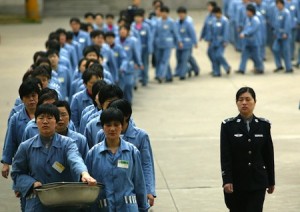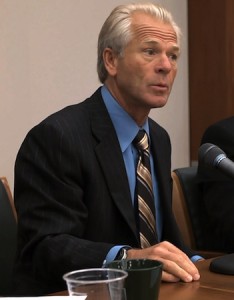
“Death by China: One Job Lost at a Time,” reveals the bitter reality of a Faustian bargain made by the United States and supported by former President Bill Clinton, who pushed for China’s admission into the World Trade Organization in 2001.
Written, directed and produced by Laguna Beach’s Peter Navarro, a professor of economics and public policy at UC Irvine’s business school, the film is based on the book by the same title that he co-authored with Greg Autry, a UCI colleague and senior economist for Virginia’s American Job Alliance, a buy-American advocate.
It presents dramatic accounts of the evisceration of the U.S. economy due to offshore emigration of domestic and multi-national manufacturers and outsourcing of labor to China, resulting in a loss of 5.5 million U.S. jobs, according to the documentary.
The film screens Friday and Saturday, Aug. 17 and 18 at the Laemmle Playhouse in Pasadena. The 7:30 p.m. screenings will be followed by a question and answer session with Navarro and invited speakers. www.deathbychina.com Orange County venues have not been chosen yet.

Although expressing ambivalence about politicians, he insists that the effort is non-partisan. “Our mission is to inform the electorate and have both candidates address the problem,” he said. “It is a grass roots kind of movie that attacks the corruption of governments and multi-national corporations.”
On a production budget of $550,000, Navarro and crew, including director of photography Kasey Kirby and composer of background music Christophe Eagelton, began filming last year in China and New York, Ohio, Michigan, Pennsylvania and Illinois, rust-belt states where “Death by China…” will be screened before the November election. Navarro’s intends to convey how U.S. policy has painted the nation into a corner economically.
Navarro carefully distinguishes between the “the good and hard working people of China” and a Communist regime bent on achieving economic and military dominance by any means. Those include what Navarro calls “weapons of job destruction,” such as currency manipulation, export tax breaks and import tariffs, low wages, inhumane working conditions and disregard of safety regulation in its products and their production including environmental pollution.
The film features, among others, Forbes columnist Gordon G. Chang, Huntington Beach’s Rep. Dana Rohrbacher and men and women from Main Street, U.S.A. A chilling account also comes from survivor Harry Wu, who recounts his 19 years spent in a forced labor camp manufacturing products meant for export. His guard’s mantra: “Much labor, much food; not so much labor, less food; no labor, no food.” He now leads Washington, D.C.’s Laogai Research Foundation, which works to expose China’s forced-labor prison camps.
Chang says China maintains predatory trade practices and predicts more ruthless undercutting as its economy slows, a looming threat to American workers. “China has elevated geopolitical concerns over trade balance. Their thinking has been that they would become the most powerful economy in the world and that their influence would grow correspondingly. But, the recent wave of money going out of China is an early indication of problems,” he said, adding that capital fleeing China already amounts to roughly $100 billion this year.
Rohrbacher maintains that he opposed China’s entry into the WTO on grounds of its human rights violations and is now concerned about piracy of intellectual property and digital technology. “It is a lawless society run by repressive individuals, not the kind of people one should be doing business with,” he said. “The film expresses the anxiety and outrage at wealth and power accumulated at the expense of American people, but yet you can’t blame the Chinese for being aggressive in representing their interests. You have to blame the American people for not representing their own interest,” he said.
Navarro consulted land use attorney Gene Gratz, a neighbor and Sundance Film Festival buff as an informal production advisor. “The film is Peter’s attempt to call a significant problem that he sees with China to the attention of Americans. He handles provocative issues and will draw a lot of passion. But, I have seen a lot of documentaries and this one ranks very high. It deserves airing,” he said.





[…] first documentary film “Death By China,” narrated by Martin Sheen, is now available on Netflix, but made its debut in March of 2012 at a […]